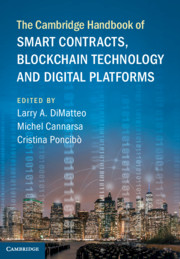Book contents
- The Cambridge Handbook of Smart Contracts, Blockchain Technology and Digital Platforms
- The Cambridge Handbook of Smart Contracts, Blockchain Technology and Digital Platforms
- Copyright page
- Dedication
- Summary of Contents
- Contents
- Contributors
- Preface
- Part I General Framework
- Part II Contract Law and Smart Contracts
- Part III Electronic Platforms and Networks
- Part IV Privacy, Security and Data Protection
- Part V Smart Contracts
- 15 Smart Contracts and the Courts
- 16 Usefulness and Dangers of Smart Contracts in Consumer Transactions
- Part VI Future of Smart Contracts, Blockchain and Artificial Intelligence
15 - Smart Contracts and the Courts
from Part V - Smart Contracts
Published online by Cambridge University Press: 25 October 2019
- The Cambridge Handbook of Smart Contracts, Blockchain Technology and Digital Platforms
- The Cambridge Handbook of Smart Contracts, Blockchain Technology and Digital Platforms
- Copyright page
- Dedication
- Summary of Contents
- Contents
- Contributors
- Preface
- Part I General Framework
- Part II Contract Law and Smart Contracts
- Part III Electronic Platforms and Networks
- Part IV Privacy, Security and Data Protection
- Part V Smart Contracts
- 15 Smart Contracts and the Courts
- 16 Usefulness and Dangers of Smart Contracts in Consumer Transactions
- Part VI Future of Smart Contracts, Blockchain and Artificial Intelligence
Summary
Chapter 15 derives some general features of smart contracts by examining the technological approach for these contracts proposed by Ethereum and Solidity language. It relies on the concept of ‘interfaces’ to designate the relationships between the computer code of a smart contract and other external elements. According to this chapter, these interfaces are the exact locations of the legal connections between a specific piece of software and the real world. In particular, it argues that the smart contract environment is not a ‘lawyer-free environment’ due to the fact that smart contracts would necessarily interfere with real world persons or institutions that would by the nature of our societies lead to legal issues.
Keywords
- Type
- Chapter
- Information
- The Cambridge Handbook of Smart Contracts, Blockchain Technology and Digital Platforms , pp. 271 - 287Publisher: Cambridge University PressPrint publication year: 2019



